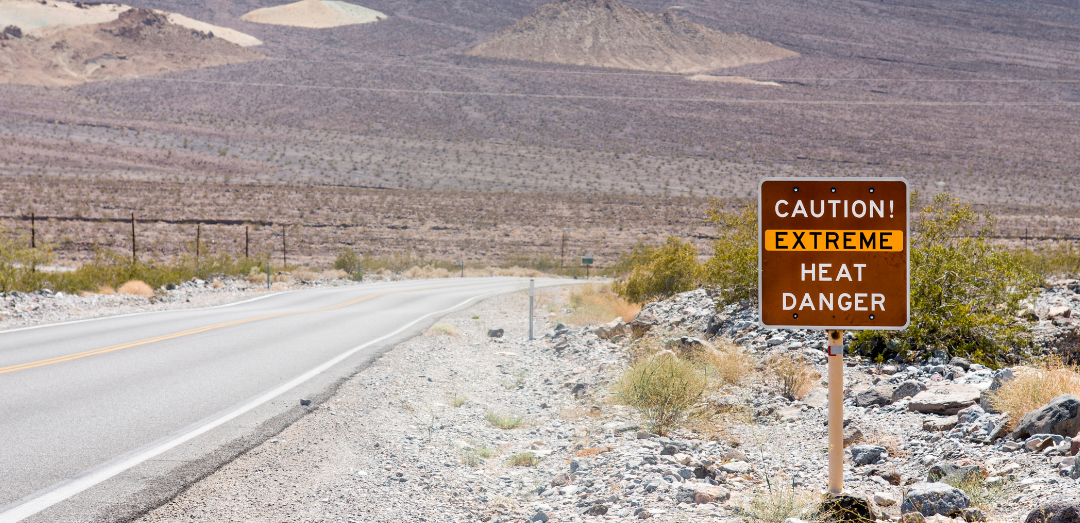
Where were you when Hurricane Katrina hit? It’s one of those natural disasters that you can never forget.
It’s August 2005. Hurricane Katrina bears down upon the American gulf coast. A large and destructive Category five hurricane, Katrina killed over 1,800 people and caused $125 billion dollars in damage between August 23rd and 31st. New Orleans and the surrounding coastline were devastated.
Katrina taught an entire generation of Americans just how deadly natural disasters can be.
My oldest son was five months old. I remember watching in horror as hundreds of thousands of people became displaced. People lost their homes, businesses, and family members. No food, water, or shelter. We were not prepared for a natural disaster of that magnitude.
And we’re not prepared for what’s coming next.
Extreme heat is getting worse
Mikhail Chester, the director of the Metis Center for Infrastructure and Sustainable Engineering at Arizona State University, predicts that Pheonix, Arizona is at high risk for a catastrophic extreme heat event on the scale of Hurricane Katrina.
The risk of a heat-driven catastrophe increases every year. What will the ‘Hurricane Katrina of extreme heat’ look like? Sure, Phoenix is hot. Blistering, even. But how can extreme heat be a natural disaster? Isn’t it just weather?
Not exactly.
“Hurricane Katrina caused a cascading failure of urban infrastructure in New Orleans that no one really predicted. Levees broke. People were stranded. Rescue operations failed. Extreme heat could lead to a similar cascading failure in Phoenix, exposing vulnerabilities and weaknesses in the region’s infrastructure that are difficult to foresee.”
Mikhail Chester, Rolling Stone Magazine
Is your state facing an extreme heat climate threat?
According to 2020 figures, Phoenix experienced 145 days over 100 degrees Fahrenheit. Compare that to Memphis, which averages just 10 days of similarly dangerous heat. By 2050, that number is projected to increase fivefold.
Statesatrisk.org gives a grade to each state’s preparedness for climate threats. Under Tennessee community preparedness, we are at high risk for extreme heat, droughts, wildfires, and inland flooding. These extreme shifts in weather are a direct result of a changing climate that is out of control. I plan to review the TN State Hazard Mitigation Plan and summarize it for a future blog.
What are we doing about extreme heat?
According to NPR’s Morning Edition, Tempe, Arizona is creating a resilience hub as a refuge from the climate crisis. The Urban Sustainability Directors Network, or USDN, describes resilience hubs as community-serving facilities augmented to support residents and coordinate resource distribution and services before, during, or after a natural hazard event.
I think Tennessee needs similar resilience hubs.
A Memphis resilience hub would be open 24 hours a day, seven days a week for anyone who needs it. Here are a few more features of what a Memphian resilience hub can be:
- A cafeteria and food pantry for those in need
- Powered by solar panels and air-conditioned for extreme heat relief
- Mental and social health services
- Play areas for kids
- Education about climate change, science communication, and climate hazards
- Located within 10 minutes of busy urban areas
Doesn’t this sound like a better Memphis to live in? Instead of a city waiting for a disaster to happen, we’d be a community prepared for the fast-burning extreme heat disaster coming our way. I have also been thinking that Memphis needs a plan to tackle the urban heat island effect, or UHI. This is when cities are too hot, especially at night, due to a lack of tree shading and surrounding concrete. I’ll be covering this topic in detail in a future blog.
What can you do right now to prepare for extreme heat?
GREEN: Educate yourself about resilience hubs and UHI from credible news and scientific outlets.
GREENER: Read the TN State Mitigation Plan
GREENEST: Identify an area in your neighborhood that is being affected by UHI. Talk to your neighbors and rally around this extreme heat issue. Bring it to the attention of your city council and discover how organized community action against climate change can improve the world one day at a time.
We are in this together. Let’s go green.

